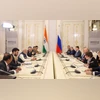Prime Minister Narendra Modi on Tuesday held a bilateral meeting with Russian President Vladimir Putin on the sidelines of the Brics summit. In his opening comments, PM Modi highlighted the need for an early resolution of the Ukraine conflict. He also announced the opening of a new Indian consulate in Russia's Kazan.
"I have been in constant touch with you on the subject of the ongoing conflict... We fully support the early establishment of peace and stability. India is ready to provide all possible cooperation in times to come," PM Modi said.
Announcing the opening of a new Indian consulate in Kazan, PM Modi said, "It is a matter of great pleasure for me to have the opportunity to visit a beautiful city like Kazan... India has deep and historical ties with this city. The opening of India's new consulate in Kazan will further strengthen these ties."
Two visits in three months
PM Modi is in Russia's Kazan to participate in the 16th Brics summit. This is the PM's second Russia visit within a span of three months. He was in Russia in July 2024 for the India-Russia Annual Summit.
More From This Section
India-Russia ties
During the previous visit, PM Modi was conferred Russia's highest civilian honour, the 'Order of Saint Andrew the Apostle', for his contribution in strengthening the ties between the two nations.
Both nations have noted how their ties have remained resilient in the backdrop of the prevailing "complex, challenging and uncertain" geopolitical situation.
Bilateral trade
India and Russia have set the target of $100 billion trade by the end of 2030. Both nations held meetings in March 2024 to commence full negotiations for a Free Trade Agreement (FTA) on goods between India and the Eurasian Economic Union (comprising Russia, Armenia, Belarus, Kazakhstan, and Kyrgyzstan).
The two sides have also expressed their intention to strengthen cooperation in manufacturing in the fields of transport engineering, metallurgy, and chemical industry.
According to Reuters, India's total imports from Russia stood at $61.43 billion in 2023, up 33 per cent compared to the previous year. Its total exports to Russia have also risen over 35 per cent to $4.3 billion in FY24.
Further, the central banks of both nations have renewed their discussions to set up a proper mechanism to expand local currency trade. In August 2024, Reserve Bank Of India officials reportedly visited Russia to discuss "settlement of payments between the countries for bilateral trade".
Oil trade
In the wake of the Russia-Ukraine war, India has taken considerable advantage of Russia's discounted oil. In July 2024, India bought $2.8 billion worth of crude oil from Russia.
In the pre-Ukraine war period, oil imports from Russia constituted less than 1 per cent of India's total oil imports. But now, its share hovers around 40 per cent.
Cooperation in Central Asia
New Delhi sees Central Asia as a region of significant strategic importance, primarily because of its rich reserves of critical minerals. This increase in interest was evident by the India-Central Asia dialogue and the first India-Central Asia summit in 2022.
However, due to lack of direct connectivity, India looks towards Russia for cooperation on regional connectivity projects, like the International North South Transport Corridor (INSTC). Russia also maintains significant influence in Central Asia through various means, including bilateral agreements and its military presence in Kyrgyzstan and Tajikistan. India is looking to leverage Russian presence in the region for boosting bilateral ties with Central Asia.
Even in the 1980s, the erstwhile Soviet Union allowed India to establish a consulate in Tashkent, which later played a crucial role in New Delhi's relations with Central Asia.
China factor
On the eve of the Brics summit, after more than four years of military standoff, India and China reached an agreement on patrolling along Line of Actual Control (LAC).
This new development could boost Russia's plans to revive the Russia-India-China (RIC) troika. Ahead of the summit, Russian Foreign Minister Sergey Lavrov reaffirmed the existence of the troika, and possibilities of its meeting.
"Although it (RIC troika) has not convened for some time due to the pandemic and other circumstances, it persists as an independent mechanism," he said.
After the recent India-China border pact, experts have also pointed out the possibility of a bilateral talk between PM Modi and Chinese President Xi Jinping on the sidelines of the Brics summit.

)